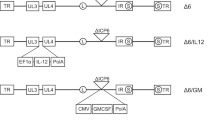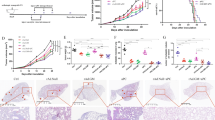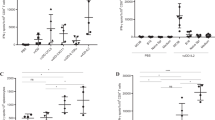Abstract
Previous studies have shown that the human melanoma differentiation-associated gene-7 (mda-7)/interleukin-24 (IL-24) has tumor-suppressor activity in vitro and in vivo. Additionally, in vitro studies using human peripheral blood mononuclear cells indicate that mda-7/IL-24 has TH1 cytokine-like activity. However, the individual properties of mda-7/IL-24 have been previously examined separately. Thus, there is not a single study that has examined both, antitumor and proimmune properties of mda-7/IL-24. Furthermore, the tumor suppressive activity and the cytokine activity of mda-7/IL-24 have not been previously tested in an immunocompetent setting. We therefore in the present study evaluated the antitumor and immune properties of mda-7/IL-24 in a murine syngeneic tumor model. In vitro, adenovirus-mediated mda-7 gene (Ad-mda7) transfer to murine fibrosarcoma (UV2237m; MCA16) and normal (10T1/2) cells significantly inhibited growth (P=0.001) and induced apoptosis in tumor cells but not in normal cells. In vivo, intratumoral administration of Ad-mda7 resulted in significant inhibition of tumor growth (P<0.05), with a subset of mice showing complete tumor regression. We next evaluated the immune potentiation activity of Ad-mda7 in a cancer vaccine model. UV2237m cells transfected with Ad-mda7 and injected into syngeneic immunocompetent C3H mice were unable to grow; however, they did grow in immunocompromised nude mice. These tumor-free C3H mice, when challenged with parental tumor cells experienced no tumor growth, suggesting induction of systemic immunity. Moreover, splenocytes prepared from vaccinated C3H mice demonstrated higher proliferative activity and produced elevated levels of TH1 cytokines compared with those from control mice. An in vitro subset analysis of splenocytes from vaccinated mice demonstrated a significant increase in the CD3+CD8+ but not the CD3+CD4+ cell population (P=0.019). Thus Ad-mda7 treatment of syngeneic tumors induces tumor cell death and promotes immune activation, leading to anticancer immunity.
This is a preview of subscription content, access via your institution
Access options
Subscribe to this journal
Receive 12 print issues and online access
$259.00 per year
only $21.58 per issue
Buy this article
- Purchase on Springer Link
- Instant access to full article PDF
Prices may be subject to local taxes which are calculated during checkout



Similar content being viewed by others
References
Lengauer C, Kinzler KW, Vogelstein B . Genetic instabilities in human cancers. Nature 1998; 396: 623–649.
Rodriguez PC, Zea AH, Ochoa AC . Mechanisms of tumor evasion from the immune response. Cancer Chemother Biol Response Modif 2003; 21: 351–364.
Cai DW, Mukhopadhyay T, Liu Y, Fujiwara T, Roth JA . Stable expression of the wild-type p53 gene in human lung cancer cells after retrovirus-mediated gene transfer. Hum Gene Ther 1993; 4: 617–624.
Ji L, Fang B, Yen N, Fong K, Minna JD, Roth JA . Induction of apoptosis and inhibition of tumorigenicity and tumor growth by adenovirus vector-mediated FHIT gene overexpression. Cancer Res 1999; 59: 3333–3339.
Nabel GJ, Nabel EG, Yang ZY, Fox BA, Plautz GE, Gao X et al. Direct gene transfer with DNA-liposome complexes in melanoma – expression, biologic activity, and lack of toxicity in humans. Proc Natl Acad Sci USA 1993; 90: 11307–11311.
Larin SS, Georgiev GP, Kiselev SL . Gene transfer approaches in cancer immunotherapy. Gene Therapy 2004; 11 (Suppl 1): S18–S25.
Roth JA, Nguyen D, Lawrence DD, Kemp BL, Carrasco CH, Gerson DZ et al. Retrovirus-mediated wild-type p53 gene transfer to tumors of patients with lung cancer. Nat Med 1996; 2: 985–991.
Clayman GL, el-Naggar AK, Lippman SM, Henderson YC, Frederick M, Merritt JA et al. Adenovirus-mediated p53 gene transfer in patients with advanced recurrent head and neck squamous cell carcinoma. J Clin Oncol 1998; 16: 2221–2232.
Gansbacher B, Zier K, Daniels B, Cronin K, Bannerji R, Gilboa E . Interleukin 2 gene transfer into tumor cells abrogates tumorigenicity and induces protective immunity. J Exp Med 1990; 172: 287–292.
Nemunaitis J, Sterman D, Jablons D, Smith II JW, Fox B, Maples P et al. Granulocyte-macrophage colony-stimulating factor gene-modified autologous tumor vaccines in non-small-cell lung cancer. J Natl Cancer Inst 2004; 96: 326–331.
Pardoll DM . Therapeutic vaccination for cancer. Clin Immunol 2004; 95: S44–S62.
Chada S, Sutton RB, Ekmekcioglu S, Ellerhorst J, Mumm JB, Leitner WW et al. MDA-7/IL-24 is a unique cytokine-tumor suppressor in the IL-10 family. Int Immunopharmacol 2004; 4: 649–667.
Saeki T, Mhashilkar A, Chada S, Branch C, Roth JA, Ramesh R . Tumor-suppressive effects by adenovirus-mediated mda-7 gene transfer in non-small cell lung cancer cell in vitro. Gene Therapy 2000; 7: 2051–2057.
Sarkar D, Su ZZ, Lebedeva IV, Sauane M, Gopalkrishnan RV, Valene K et al. mda-7 (IL-24) mediates selective apoptosis in human melanoma cells by inducing the coordinated overexpression of the GADD family of genes by means of p38 MAPK. Proc Natl Acad Sci USA 2002; 99: 10054–10059.
Saeki T, Mhasilkar A, Swanson X, Zou-Yang XH, Sieger K, Kawabe S et al. Inhibition of human lung cancer growth following adenovirus-mediated mda-7 gene expression in vivo. Oncogene 2002; 21: 4558–4566.
Mhashilkar AM, Schrock RD, Hindi M, Liao J, Sieger K, Kourouma F et al. Melanoma differentiation associated gene-7 (mda-7): a novel anti-tumor gene for cancer gene therapy. Mol Med 2001; 7: 271–282.
Chada S, Mhashilkar A, Ramesh R, Mumm JB, Sutton RB, Bocangel D et al. Bystander activity of Ad-mda7: human MDA-7 protein kills melanoma cells via an IL-20 receptor-dependent but STAT3-independent mechanism. Mol Ther 2004; 10: 1085–1095.
Ramesh R, Mhashilkar A, Tanaka F, Saito Y, Branch CD, Sieger K et al. Melanoma differentiation-associated gene 7/interleukin (IL)-24 is a novel ligand that regulates angiogenesis via the IL-22 receptor. Cancer Res 2003; 63: 5105–5113.
Caudell EG, Mumm JB, Poindexter N, Ekmekcioglu S, Mhashilkar AM, Yang XH . The protein product of the tumor suppressor gene, melanoma differentiation-associated gene 7, exhibits immunostimulatory activity and is designated IL-24. J Immunol 2002; 168: 6041–6046.
Oida Y, Gopalan B, Miyahara R, Inoue S, Branch CD, Mhashilkar AM et al. Sulindac enhances adenoviral vector expressing mda-7/IL-24-mediated apoptosis in human lung cancer. Mol Cancer Ther 2005; 4: 291–304.
Nishikawa T, Ramesh R, Munshi A, Chada S, Meyn RE . Adenovirus-mediated mda-7 (IL24) gene therapy suppresses angiogenesis and sensitizes NSCLC xenograft tumors to radiation. Mol Ther 2004; 9: 818–828.
Talmadge JE, Fidler IJ . Enhanced metastatic potential of tumor cells harvested from spontaneous metastases of heterogeneous murine tumors. J Nat Cancer Inst 1982; 69: 975–998.
Ramesh R, Saeki T, Templeton NS, Ji L, Stephens LC, Ho I et al. Successful treatment of primary and disseminated human lung cancers by systemic delivery of tumor suppressor genes using an improved liposome vector. Mol Ther 2001; 3: 337–350.
Love-Schimenti CD, Kripke ML . Dendritic epidermal T cells inhibit T cell proliferation and may induce tolerance by cytotoxicity. J Immunol 1994; 53: 3450–3456.
Lyons AB, Parish CR . Determination of lymphocyte division by flow cytometry. J Immunol Meth 1994; 171: 131–137.
Kurts C, Carbone FR, Barnden M, Blanas E, Allison J, Heath WR et al. CD4+ T cells help impairs CD+ T cells deletion induced by cross-presentation of self antigens and favors autoimmunity. J Exp Med 1997; 186: 2057–2062.
Parmiani G, Rodorfo M, Melani C . Immunological gene therapy with ex vivo gene-modified tumor cells: a critique and a reappraisal. Human Gene Ther 2002; 1: 1269–1275.
Lipshutz GS, Flebbe-Rehwaldt L, Gaensler KML . Reexpression following readministration of an adenoviral vector in adult mice after initial in utero adenoviral administration. Mol Ther 2000; 2: 374–380.
Tong A, Nemunaitis J, Su D, Zhang Y, Cunningham C, Senzer N et al. Intratumoral injection of INGN 241: a non-replicating adenovector expressing the melanoma-differentiation associated gene-7 (MDA-7/IL-24): biologic outcome in advanced cancer patients. Mol Ther 2005; 11: 160–172.
Acknowledgements
We thank Karen Ramirez for help with the fluorescence-activated cell sorting analysis and Debbie Smith for editorial assistance. This work was supported by funds from the National Cancer Institute Grants RO1 CA102716 (Ramesh), PO1 CA06294 (Ramesh), CA89778 (Chada), CA88421 (Chada), CA097598 (Chada) and Cancer Center Support Grant CA16672; Texas Higher Education Coordinating Board ATP/ARP Grant 003657-0078-2001 (Ramesh); Institutional Research Grant (Ramesh); WM Keck Gene Therapy Grant (Ramesh) and sponsored research agreement with Introgen Therapeutics Inc.
Author information
Authors and Affiliations
Corresponding author
Rights and permissions
About this article
Cite this article
Miyahara, R., Banerjee, S., Kawano, K. et al. Melanoma differentiation-associated gene-7 (mda-7)/interleukin (IL)-24 induces anticancer immunity in a syngeneic murine model. Cancer Gene Ther 13, 753–761 (2006). https://doi.org/10.1038/sj.cgt.7700954
Received:
Revised:
Accepted:
Published:
Issue Date:
DOI: https://doi.org/10.1038/sj.cgt.7700954
Keywords
This article is cited by
-
Interleukin-24-mediated antitumor effects against human glioblastoma via upregulation of P38 MAPK and endogenous TRAIL-induced apoptosis and LC3-II activation-dependent autophagy
BMC Cancer (2023)
-
Enhanced synergistic antitumor effect of a DNA vaccine with anticancer cytokine, MDA-7/IL-24, and immune checkpoint blockade
Virology Journal (2022)
-
Mesenchymal stem cells derived from iPSCs expressing interleukin-24 inhibit the growth of melanoma in the tumor-bearing mouse model
Cancer Cell International (2020)
-
Molecular targets and signaling pathways regulated by interleukin (IL)-24 in mediating its antitumor activities
Journal of Molecular Signaling (2013)
-
Adenovirus-mediated intratumoral expression of immunostimulatory proteins in combination with systemic Treg inactivation induces tumor-destructive immune responses in mouse models
Cancer Gene Therapy (2011)



